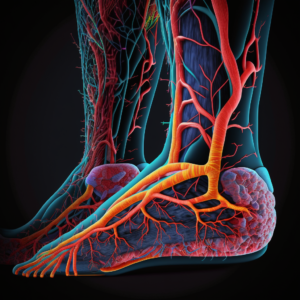Peripheral neuropathy is a condition that affects the peripheral nervous system, which includes the nerves outside of the brain and spinal cord. It can cause a wide range of symptoms, which can vary depending on the specific nerve type affected. At Elevation Health, our clinic specializes in peripheral neuropathy and understands the importance of identifying the type of nerve involvement in order to provide effective treatment. This blog post will explore the different types of peripheral neuropathy and how their symptoms can vary.
Sensory Neuropathy:
Sensory neuropathy primarily affects the sensory nerves that transmit information about touch, temperature, and pain. Patients with sensory neuropathy often experience symptoms such as:
- Numbness and Tingling: Sensations of numbness, tingling, or a “pins and needles” feeling in the affected areas. This can occur in the hands, feet, or other parts of the body.
- Hypersensitivity: Some individuals may experience heightened sensitivity to touch or temperature changes, making even light touch or mildly warm water feel extremely uncomfortable.
- Loss of Coordination: Sensory neuropathy can disrupt the normal feedback from the nerves, leading to difficulty in maintaining balance and coordination.
Motor Neuropathy:
Motor neuropathy affects the motor nerves that control muscle movement. When these nerves are damaged, patients may experience the following symptoms:
- Muscle Weakness: Weakness in the affected muscles, making it difficult to perform daily activities such as walking, climbing stairs, or lifting objects.
- Muscle Cramps and Twitching: Involuntary muscle contractions, spasms, or twitching, which can be painful and disruptive.
- Muscle Atrophy: Prolonged motor neuropathy can result in muscle wasting and loss of muscle bulk, leading to further weakness and decreased mobility.
Autonomic Neuropathy:
Autonomic neuropathy affects the nerves that control involuntary bodily functions, such as heart rate, blood pressure, digestion, and bladder control. Symptoms of autonomic neuropathy may include:
- Digestive Issues: Nausea, vomiting, bloating, constipation, or diarrhea due to impaired gastrointestinal nerve function.
- Cardiovascular Problems: Abnormal heart rate or blood pressure fluctuations, which can lead to dizziness, fainting, or an increased risk of heart attack.
- Sexual Dysfunction: Erectile dysfunction in men and vaginal dryness or reduced libido in women may occur due to autonomic nerve damage.
- Bladder Dysfunction: Difficulty emptying the bladder completely, urinary incontinence, or urinary retention can result from impaired nerve signals.
Mononeuropathy:
Mononeuropathy refers to damage or impairment of a single nerve, often caused by injury or compression. Common symptoms of mononeuropathy include:
- Pain and Weakness: Severe pain, weakness, or loss of sensation in the area supplied by the affected nerve. This can occur in the wrist (carpal tunnel syndrome), elbow (cubital tunnel syndrome), or other specific locations.
- Difficulty with Fine Movements: Impaired dexterity and difficulty performing tasks that require precise movements, such as writing or buttoning clothes.
Peripheral neuropathy is a complex condition that can manifest in various ways depending on the type of nerve affected. Understanding the specific symptoms associated with different types of neuropathy is crucial for accurate diagnosis and effective treatment. At Elevation Health, we specialize in peripheral neuropathy and offer comprehensive care to address the unique needs of our patients. If you or someone you know is experiencing symptoms of peripheral neuropathy, it is important to seek medical attention and consult with a qualified healthcare professional. They can conduct a thorough evaluation, including a medical history review, physical examination, and diagnostic tests, to determine the underlying cause of the neuropathy and develop a personalized treatment plan.

In many cases, peripheral neuropathy may be caused by underlying conditions such as diabetes, autoimmune disorders, infections, or exposure to toxins. Treating the underlying cause can often help alleviate the symptoms and slow down the progression of neuropathy. Therefore, an accurate diagnosis is crucial for effective management.
At Elevation Health, our team of experienced healthcare providers utilizes a multidisciplinary approach to address peripheral neuropathy. Our treatments may include:
- Medications: Depending on the type and severity of neuropathy, various medications can be prescribed to alleviate symptoms such as pain, tingling, or muscle spasms. These may include pain relievers, topical creams, or medications that target nerve-related pain.
- Physical Therapy: Physical therapy plays a crucial role in improving muscle strength, flexibility, and coordination. Through targeted exercises, patients can regain mobility and enhance their quality of life.
- Transcutaneous Electrical Nerve Stimulation (TENS): TENS therapy involves the use of low-level electrical currents applied to the affected area to relieve pain and stimulate the nerves.
- Nerve Blocks: In some cases, nerve blocks may be recommended to temporarily relieve pain by injecting local anesthetics or anti-inflammatory medications near the affected nerves.
- Alternative Therapies: Complementary treatments such as acupuncture, chiropractic care, or massage therapy may also be beneficial in managing peripheral neuropathy symptoms and promoting overall well-being.
It is important to remember that every patient’s situation is unique, and treatment approaches may vary. At Elevation Health, we prioritize personalized care and work closely with our patients to develop a customized treatment plan tailored to their specific needs.
In addition to professional medical care, there are also steps individuals can take to manage peripheral neuropathy symptoms on their own:
- Optimal Blood Sugar Control: If diabetes is the underlying cause of neuropathy, maintaining stable blood sugar levels through medication, diet, and lifestyle modifications can help slow down the progression of nerve damage.
- Healthy Lifestyle Choices: Eating a balanced diet, exercising regularly, and avoiding smoking and excessive alcohol consumption can contribute to overall nerve health and well-being.
- Foot Care: Individuals with peripheral neuropathy should pay special attention to foot care. Regularly inspecting the feet for any cuts, blisters, or infections, and wearing comfortable shoes with proper support and cushioning are essential.
- Pain Management Techniques: Techniques such as relaxation exercises, meditation, or mindfulness can help individuals cope with pain and reduce stress levels.
In conclusion, peripheral neuropathy is a condition that can present with a wide range of symptoms depending on the type of nerve affected. At Elevation Health, we specialize in understanding these variations and providing comprehensive care to our patients. Through accurate diagnosis, personalized treatment plans, and a multidisciplinary approach, we aim to alleviate symptoms, slow down progression, and improve the overall quality of life for individuals with peripheral neuropathy. If you or someone you know is experiencing symptoms of peripheral neuropathy, we encourage you to reach out to our clinic for professional evaluation and guidance. Together, we can work towards managing the condition and helping you regain control of your life.


